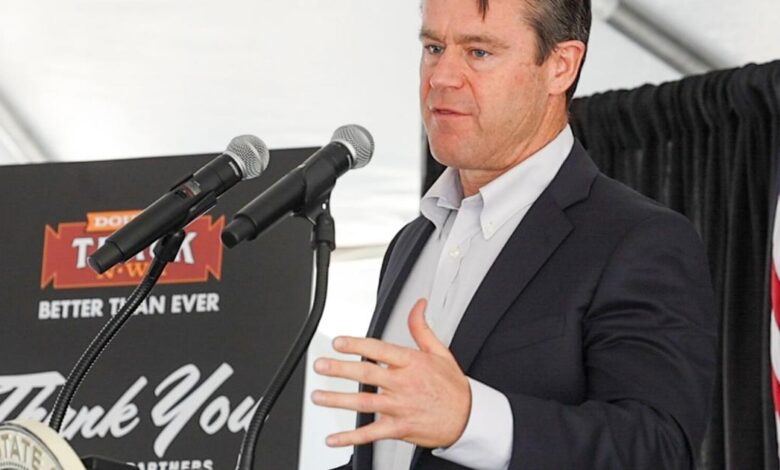Young crafts road map for policy on artificial intelligence

U.S. Sen. Todd Young, R-Ind., welcomes the opportunities set to be unleashed by artificial intelligence (AI) while simultaneously urging the new technology be carefully rolled out to minimize any potential harms to Americans and national security.
Young is among four members of the Bipartisan Senate AI Working Group that’s spent the past year closely evaluating the promise and perils of AI in hundreds of stakeholder meetings and nine all-senator Insight Forums focused on specific AI impacts.
The group’s 31-page final report — co-written by Young; Senate Majority Leader Chuck Schumer, D-N.Y.; U.S. Sen. Martin Heinrich, D-Nev.; and U.S. Sen. Mike Rounds, R-S.D. — provides a kind of road map for the Senate to use as it crafts AI policy this year and in the future.
“The rapid pace of AI innovation brought this bipartisan working group together to consider how policymakers can ensure the incredible and promising aspects of AI are able to flourish while guarding against its risks,” Young said.
People are also reading…
“This road map represents the most comprehensive and impactful bipartisan recommendations on artificial intelligence ever issued by the legislative branch. Our goal is to ensure the United States maintains its leadership in AI innovation, enabling the American people to reap the substantial national security, economic and societal benefits of an AI-driven future.”
The report highlights a number of potential policy priorities the Senate may want to consider advancing in tandem with the House and the president, including:
- Increasing funding for AI innovation to propel U.S. leadership in AI, maintain America’s global competitiveness, and perform cutting-edge AI research and development.
- Ensuring enforcement of existing laws for AI, including addressing any gaps or unintended harmful bias; prioritizing the development of testing standards to understand potential AI harms; and developing use case-specific requirements for AI transparency.
- Encouraging a conscientious consideration of the impact AI will have on the U.S. workforce, including the potential for job displacement and the need to upskill and retrain workers.
- Bolstering national security by leading globally in the adoption of emerging technologies and addressing national security threats, risks and opportunities for AI.
- Addressing challenges posed by deepfakes related to election content and nonconsensual intimate images, as well as examining the impacts of AI on professional content creators and the journalism industry.
- Identifying ways to ensure higher education institutions and businesses can compete in AI development, in part by reviewing federal statutes and regulations that may affect innovation and by fully funding the National AI Research Resource.
- Establishing a strong, comprehensive federal data privacy framework.
- Mitigating the threat of potential long-term risk scenarios.
“No technology offers more promise to our modern world than artificial intelligence. But AI also presents a host of new policy challenges,” Schumer said. “Harnessing the potential of AI demands an all-hands-on-deck approach and that’s exactly what our bipartisan AI working group has been leading.”
“After talking to advocates, critics, academics, labor groups, civil rights leaders, stakeholders, developers, and more, our working group was able to identify key areas of policy that have bipartisan consensus. Now, the work continues with our committees, chairmen, and ranking members to develop and advance legislation with urgency and humility.”
The full report of the AI working group is available online at nwi.com.
Gallery: Indiana historical markers in the Region
First Physician
First Physician
Location: 2985 W. 73rd Place, Merrillville
Erected by Woman’s Auxiliary, Lake County Medical Society
Henry D. Palmer, M.D. (1809-1877) located at this site in 1836. First physician in Lake County, he was also counselor to the pioneers for 40 years and member of the underground railroad aiding escaped slaves.
Great Sauk (Sac) Trail
Great Sauk (Sac) Trail
Location: Van Buren Street at West 73rd Avenue (Old U.S. 30/Lincoln Highway) on traffic median east of Calumet Cemetery and west of Broadway, Merrillville
Erected by Indiana Sesquicentennial Commission, 1966
Part of a transcontinental trail used by prehistoric peoples of North America, it passed through modern Detroit, Rock Island and Davenport in the Midwest. The trail was important into the 19th century.
St. John’s Lutheran Church Tolleston
St. John’s Lutheran Church Tolleston
Location: 2235 W. 10th Avenue at Taft Avenue, southeast corner, Gary
St. John’s Church, the oldest surviving institution in Gary and north of the Little Calumet River, began with the work of the Rev. Henry Wunder in the early 1860’s. He regularly came from Chicago by horse and buggy. Baptism records date from 1863; the first church was built on this site in 1868 or 1869; 1870 is celebrated as date of organization. The church served German immigrants to Tolleston (named for George Tolle who came in 1856). Tolleston was annexed to Gary in 1910.
Dutch in the Calumet Region
Dutch in the Calumet Region
Location: 8941 Kleinman Road, Highland
Erected 1992 Indiana Historical Bureau and Lamprecht Florist & Greenhouse, established 1923
Dutch immigrants after 1850 began moving to this area because of its similarities to their homeland. They helped to locate ditches to drain water from the extensive marshes, leaving rich land to expand successful horticultural activities.
St. John Township School, District #2
St. John Township School, District #2
Location: 1515 Joliet Street (Old U.S. 30/Lincoln Highway), east of St. John Road at the St. John Township Community Center, Schererville
Erected 1995 Indiana Historical Bureau and Committee to Save Township School #2
Built, 1853, approximately one half mile south; closed, 1907; moved to this site and restored for educational and community uses, 1993-1994. One of twelve St. John Township schools; structure typical of early one-room school buildings in Indiana.
The Lincoln Highway/The Ideal Section
The Lincoln Highway/The Ideal Section
Location: Southeast corner U.S. 30 (Joliet Street) and Janice Drive, Schererville
Erected 1996 Indiana Historical Bureau, Northwest Indiana Lincoln Highway Association, Dyer and Schererville Historical Societies, Sand Ridge Bank, Welsh, Inc.
United States’ first transcontinental highway, constructed 1913-1928, from New York City to San Francisco. Dedicated to the memory of Abraham Lincoln. Conceived by Carl G. Fisher to encourage building “good roads.” Sponsored by Lincoln Highway Association and supported by automotive industries.
The Lincoln Highway/The Ideal Section
“Ideal Section” – 1.5 miles – of Lincoln Highway, completed 1923, designed and built as a model for road construction. Funded by county, state, and U.S. Rubber Co. Features included 100 foot right-of-way, 40 foot paved width, 10 inch steel-reinforced concrete, underground drainage, lighted, landscaped, bridge, and pedestrian pathways.
Froebel School – side 1
Froebel School – side 1
Location: 15th Avenue and Madison Street, Gary
Installed 2014 Indiana Historical Bureau, Froebel Alumni Park Committee, and Northern Indiana Public Service Company
Froebel opened here, 1912, as many European immigrants and southern blacks moved to Gary for jobs in steel mills. An experiment in progressive education, it served students of diverse backgrounds and the local community. Despite early status as integrated school, black students were excluded from many extracurricular activities and facilities into 1940s. Closed 1977.
Continued
Froebel School
Froebel School
Location: 15th Avenue and Madison Street, Gary
Installed 2014 Indiana Historical Bureau, Froebel Alumni Park Committee, and Northern Indiana Public Service Company
After WWII, Froebel made national headlines when hundreds of white students walked out protesting “integration experiment” there. “Hate strikes” lasted several weeks in 1945 and reflected growing racial tension in North. In 1946, Gary school board adopted desegregation policy, but discrimination continued. Indiana state law desegregating public schools passed 1949.
Stewart Settlement House
Stewart Settlement House
Location: 1501 E. Massachusetts St., Gary
Installed 2014 Indiana Historical Bureau, Indiana Landmarks, and Christ United Methodist Church
Stewart House was organized during depression of 1921 to provide social services for Gary’s black community. A vital neighborhood center for unemployed WWI veterans and southern blacks who migrated for jobs in steel mills, it helped thousands adjust to urban life. Services included lodging and meals, as well as legal, medical, and employment advice. Moved here, 1925.
Stewart Settlement House
Stewart Settlement House
Location: 1501 E. Massachusetts St., Gary
Installed 2014 Indiana Historical Bureau, Indiana Landmarks, and Christ United Methodist Church
U.S. Steel, with an interest in regulating its workers, helped fund the settlement house, designed by architect W.W. Cooke. The Methodist Episcopal Church and Gary’s blacks also donated funds. Rev. Frank Delaney guided its development as superintendent, 1920-1939, and made it a source of pride for blacks. During Great Depression, it aided hundreds daily. Closed 1970s.
Origin of Dr. MLK Day Law
Origin of Dr. MLK Day Law
Location: 1927 Madison St., Gary
Installed 2019 Indiana Historical Bureau, KHEF, Inc., Atty. Junifer Hall, Atty. Jacqueline Hall, and Law Office of Deacon-Atty. John Henry Hall
Rep. Katie Hall (1938-2012)
Democratic leader Katie Hall was born in rural Mississippi and moved to Indiana in 1960. She taught in Gary before serving in the Indiana General Assembly, 1974-82. Hall became the first African American U.S. Representative from Indiana, serving 1982-85. During her tenure, she authored and sponsored the bill that made Dr. Martin Luther King, Jr. Day a federal holiday.
Origin of Dr. MLK Day Law
Origin of Dr. MLK Day Law
Location: 1927 Madison St., Gary
Installed 2019 Indiana Historical Bureau, KHEF, Inc., Atty. Junifer Hall, Atty. Jacqueline Hall, and Law Office of Deacon-Atty. John Henry Hall
Origin of Dr. MLK Day Law
The struggle to make Dr. King’s birthday a federal holiday began soon after the civil rights leader’s death in 1968. Growing interest, publicity, and advocacy helped Representative Hall secure passage of a bill in 1983. President Ronald Reagan signed the bill into law that November, designating every third Monday in January as the holiday. Celebration began in 1986.
Bailly Homestead
Bailly Homestead
Location: Bailly Cemetery, U.S. 12
Marker no longer standing.
Home of Joseph Bailly, a French Canadian, who established a fur trading post here on the Detroit-Chicago road in 1822. It became a center of trade, culture and religion. The family cemetery is on the land near by.
Iron Brigade
Iron Brigade
Location: Eastbound U.S. 20 at southeast corner of Ind. 49 overpass, Chesterton
Erected 1995 Indiana Historical Bureau, Porter Co. Tour. Com., Indpls. Civil War Rnd. Tbl., Porter Cmp. 116, Dept. of Ind., Sons of Un. Vets. of Civil War
Composed of infantry regiments from Indiana, Wisconsin, and Michigan, the Iron Brigade fought with Army of the Potomac during the Civil War (1861-1865). Received name for valor at battle of South Mountain, Maryland (1862). Sustained combat fatalities among the highest in the Union armies.
Willow Creek Confrontation
Willow Creek Confrontation
Location: Southeast corner of Woodland Park, 2100 Willow Creek Road, Portage
Erected 1995 Indiana Historical Bureau
As railroad lines expanded through U.S., conflict occurred between competing lines. Michigan Central Railroad, with track in Porter County since 1851, briefly defied state militia and court orders (1874) to allow Baltimore and Ohio Railroad to cross its track. Crossing was built at Willow Creek Station.
Ogden ski jump.jpg
Ogden Dunes Ski Jump
Location: Kratz Field, 82 Hillcrest Road at Boat Club Road, Ogden Dunes
Erected 1997 Indiana Historical Bureau and Historical Society of Ogden Dunes.
Steel and wood ski jump with adjustable height and length was built here for Ogden Dunes Ski Club, incorporated in 1927 to promote winter sports. Five annual events with international competitors were held 1928-1932, with 7, 000 to 20, 000 spectators. Reputed to be the largest artificial ski jump at the time. Dismantled after 1932 event.
Teale 1.jpg
Edwin Way Teale
Location: 285 E. U.S. Highway 20, Chesterton
Installed: 2009 Indiana Historical Bureau and Musette Lewry Trust
Born 1899 in Illinois, Teale became an influential naturalist, author, and photographer[ who won 1966 Pulitzer Prize for his book Wandering Through Winter. Teale wrote that boyhood summers and holidays spent near here at his grandparents’ farm inspired his interest in nature. Teale moved to New York City; employed by Popular Science Monthly 1928-1941.
Teale 2.jpg
Edwin Way Teale
Location: 285 E. U.S. Highway 20, Chesterton
Installed: 2009 Indiana Historical Bureau and Musette Lewry Trust
Teale published his first critically acclaimed book, Grassroot Jungles, in 1937. In 1943, he published Dune Boy, recollections of time spent exploring the dunes and woodlands in this area. During his life, he wrote, edited, and contributed to over 30 books, which educated Americans about nature’s importance and beauty. He died in Connecticut in 1980.
Steel 1.jpg
Legacy of Steel/Burns Harbor Steel Plant
Location: Burns Harbor Town Hall, 1240 N. Boo Rd., Burns Harbor
Installed 2018 Indiana Historical Bureau, ArcelorMittal, and the Town of Burns Harbor
In the early 1900s, steel plants were developed on southern Lake Michigan to improve access to growing Midwest markets. After purchasing 3,300 acres in Porter County, Bethlehem Steel built and began its Burns Harbor operations in 1964. The plant’s development spurred local conservation efforts leading to the creation of the Indiana Dunes National Lakeshore in 1966.
Steel 2.jpg
Legacy of Steel/Burns Harbor Steel Plant
Location: Burns Harbor Town Hall, 1240 N. Boo Rd., Burns Harbor
Installed 2018 Indiana Historical Bureau, ArcelorMittal, and the Town of Burns Harbor
The Burns Harbor plant was key to building the Port of Indiana and incorporation of the Town of Burns Harbor in 1967. Designed as a fully integrated plant, it relies on the port for transporting raw materials. Since 1969, Burns Harbor remains the newest integrated U.S. steel facility. Global steelmaker ArcelorMittal gained ownership of the Burns Harbor plant in 2007.
Civil War camps.jpg
Civil War Camps
Location: Ind. 2 W and Colfax Avenue, La Porte
Erected by the Indiana Civil War Centennial Commission, 1963
Two Civil War training camps: Colfax and Jackson, were located near La Porte. The 9th and 29th Indiana Volunteer Infantry regiments were organized and trained here.
Old lighthouse.jpg
Old Lighthouse
Location: Old Lighthouse Museum in Washington Park, Michigan City
Marker no longer standing. Replaced by local marker.
Built on the water’s edge, 1858, by the United States Government. One of the first lights on the Great Lakes. Harriet E. Colfax was the tender from 1853-1903. Remodelled 1904, electrified 1933, discontinued 1960.
Railroad.jpg
Chicago-New York Electric Air Line Railroad
Location: CR 250 and Ind. 39, south LaPorte
Erected 1995 Indiana Historical Bureau.
Proposed in 1905 as a 742 mile, straight-line, high speed route, without crossings; estimated ten hours travel time at a cost of ten dollars. Just under twenty miles, between LaPorte and Chesterton, were constructed, 1906-1911.
Camp Anderson.jpg
Camp Anderson
Location: 2404 E. Michigan Boulevard at Carroll Street, Michigan City
Erected 1996 Indiana Historical Bureau and McDonald’s Restaurant
One of three Civil War training camps in La Porte County. Site is one fourth mile west. Named for Colonel Edward Anderson. Used 1863-1864 to train Indiana Union volunteers of the 127th, 128th, and 129th regiments.
Boundary line 1.jpg
Indiana Territory Boundary Line
Location: 213 Pine Lake Avenue, LaPorte
Erected 1999 Indiana Historical Bureau, the Hinton Family, and L Porte County Historical Society, Inc.
Northwest Territory formed 1787; Indiana Territory formed 1800. Admission of Ohio 1803 and formation of Michigan Territory 1805 established Indiana Territory’s northern boundary at southern tip of Lake Michigan. When Indiana became state in 1816, Congress moved boundary ten miles north giving Indiana part of Lake Michigan.
Boundary line 2.jpg
Indiana Territory Boundary Line
Location: 213 Pine Lake Avenue, LaPorte
Erected 1999 Indiana Historical Bureau, the Hinton Family, and L Porte County Historical Society, Inc.
Northern boundary of Indiana Territory established at southern tip of Lake Michigan when Michigan Territory formed in 1805.
LaPorte courthouse 1.jpg
LaPorte County Courthouse
Location: 813 Lincolnway and Michigan Avenue, southeast corner of LaPorte County Courthouse lawn
Installed: 2001 Indiana Historical Bureau, LaPorte County Board of Commissioners, and LaPorte County Historical Society
County formed by Indiana General Assembly and LaPorte selected county seat 1832. Three courthouses built on this site: first 1833, second 1847-1848. Present courthouse constructed 1892-1894 of Lake Superior Red Sandstone; designed by Brentwood S. Tolan of Fort Wayne in Richardsonian Romanesque Style. Incorporates cornerstone from 1848 courthouse.
LaPorte courthouse 2.jpg
LaPorte County Courthouse
Location: 813 Lincolnway & Michigan Avenue, SE corner of La Porte County Courthouse lawn, LaPorte
Installed: 2001 Indiana Historical Bureau, La Porte County Board of Commissioners, and La Porte County Historical Society, Inc.
Features include open-arched central tower, stained glass window transoms, wood paneling, and gilded friezes. Goddess of Justice stained glass graces courtroom. Tower has 272-piece glass skylight; gargoyles decorate exterior. Included in Downtown La Porte Historic District, listed in National Register of Historic Places 1983.
Carnegie 1.jpg
LaPorte’s Carnegie Library
Location: LaPorte County Public Library, SW corner of 904 Indiana Avenue/US 35 & Maple Avenue
Installed: 2002 Indiana Historical Bureau and Friends of the LaPorte County Public Library
La Porte’s first public library was established 1896. La Porte City School Board was awarded $27, 500 Carnegie grant 1916; by 1919 local support had been secured to meet grant requirements. Architect Wilson B. Parker designed the Neo-Classical style structure. Library opened in 1920 with 30, 000 volumes.
Carnegie 2.jpg
LaPorte’s Carnegie Library
Location: LaPorte County Public Library, SW corner of 904 Indiana Avenue/US 35 & Maple Avenue
Installed: 2002 Indiana Historical Bureau and Friends of the LaPorte County Public Library
Renovation and expansion designed by architect William Koster; building dedicated 1991. Original 1920 section retained. Library has played a major role in community’s development. One of 1, 679 libraries built in U.S. with funds from philanthropist Andrew Carnegie. Indiana built more Carnegie libraries than any other state.
Rumely Co 1.jpg
The Rumely Companies
Location: NW corner of Madison Street & Lincolnway, La Porte
Installed: 2003 Indiana Historical Bureau and Rumely Historic Recognition Committee
Meinrad Rumely (1823-1904), a German immigrant, founded a blacksmith shop here 1853, which grew into a dominant company through reorganizations and acquisitions. Rumely companies in La Porte benefited from available rail transportation plus German and later Polish immigrant laborers. Products included a wide variety of agricultural machines.
Rumely Co 2.jpg
The Rumely Companies
Location: NW corner of Madison Street & Lincolnway, La Porte
Installed: 2003 Indiana Historical Bureau and Rumely Historic Recognition Committee
Rumely’s prizewinning thresher later became one of the earliest powered by steam. Thousands of OilPull tractors sold worldwide 1910-1930. Rumely companies were at the forefront of mechanization of American and world agriculture and had significant impact on La Porte. Allis-Chalmers acquired the firm 1931 and closed La Porte plant 1983.
Lincoln train 1.jpg
The Lincoln Funeral Train
Location: 100 E. Michigan Blvd. (U.S. 12), Michigan City
Installed 2010 Indiana Historical Bureau and Indiana Abraham Lincoln Bicentennial Commission
Assassinated President Abraham Lincoln’s funeral was April 19, 1865 at the White House. The funeral train left for Springfield, Illinois April 21 directed by military; stops en route allowed the public to pay homage. From Indianapolis, train passed mourners lighted by bonfires and torches along the way; arrived in Michigan City by 8:35 a.m., May 1.
Lincoln train 2.jpg
The Lincoln Funeral Train
Location: 100 E. Michigan Blvd. (U.S. 12), Michigan City
Installed 2010 Indiana Historical Bureau and Indiana Abraham Lincoln Bicentennial Commission
Residents decorated depot north of here with memorial arches adorned with roses, evergreens, flags, and images of Lincoln. Train stopped to switch engines and to allow dignitaries from Illinois and Indiana to board. Sixteen women entered funeral car to place flowers on casket. Train left for Chicago on Michigan Central Railroad; track was lined with mourners.
LaPorte university 1.jpg
LaPorte University/Indiana Medical College
Location: Lincoln Elementary School, SE corner of Clay St. and Harrison St., LaPorte
Installed 2018 Indiana Historical Bureau and the Healthcare Foundation of LaPorte
LaPorte University was established in the early 1840s to include law, literary, and medical departments. The medical department, later Indiana Medical College, began classes by 1842. Its distinguished faculty attracted students from across the U.S. Notable attendees included Dr. William W. Mayo, whose practice evolved into Mayo Clinic, and Dr. William H. Wishard.
Laporte university 2.jpg
LaPorte University/Indiana Medical College
Location: Lincoln Elementary School, southeast corner of Clay Street and Harrison Street, LaPorte
Installed 2018 Indiana Historical Bureau and the Healthcare Foundation of LaPorte
Before the university’s founding, Indiana offered few opportunities for professional medical training. The medical college trained skilled doctors in the Midwest, preparing them for the region’s medical needs in surgery, anatomy, theory, and obstetrics. Classes ceased circa 1850; it consolidated with Indiana Central Medical College (1849-1852) in Indianapolis, 1851.
Source: Indiana Historical Bureau, www.in.gov/history/
Gary Roosevelt 1
Gary Roosevelt High School
730 W. 25th Ave., Gary
Installed 2020 Indiana Historical Bureau, Lady Panthers & Supporters ’63, Roosevelt Adult Booster Club, National Gary Theodore Roosevelt Alumni Assoc., Inc., and Indiana Landmarks
As Gary grew in the early 1900s, African American students were segregated within white schools or overcrowded into small, separate schools. To compensate, officials transferred some Black students to Emerson High School in 1927. After over 600 white students walked out in protest, the school board reinforced segregation by building a new school for the Black community.
Gary Roosevelt 2
Gary Roosevelt High School
730 W. 25th Ave., Gary
Installed 2020 Indiana Historical Bureau, Lady Panthers & Supporters ’63, Roosevelt Adult Booster Club, National Gary Theodore Roosevelt Alumni Assoc., Inc., and Indiana Landmarks
Theodore Roosevelt High School was dedicated in 1931 as an all-Black K-12 school. While many community members opposed segregation, they took pride in Roosevelt, and strove to make it equal to Gary’s white schools. It employed highly educated Black teachers, pushed students to excel in academics and sports despite discrimination, and produced many distinguished alumni.



